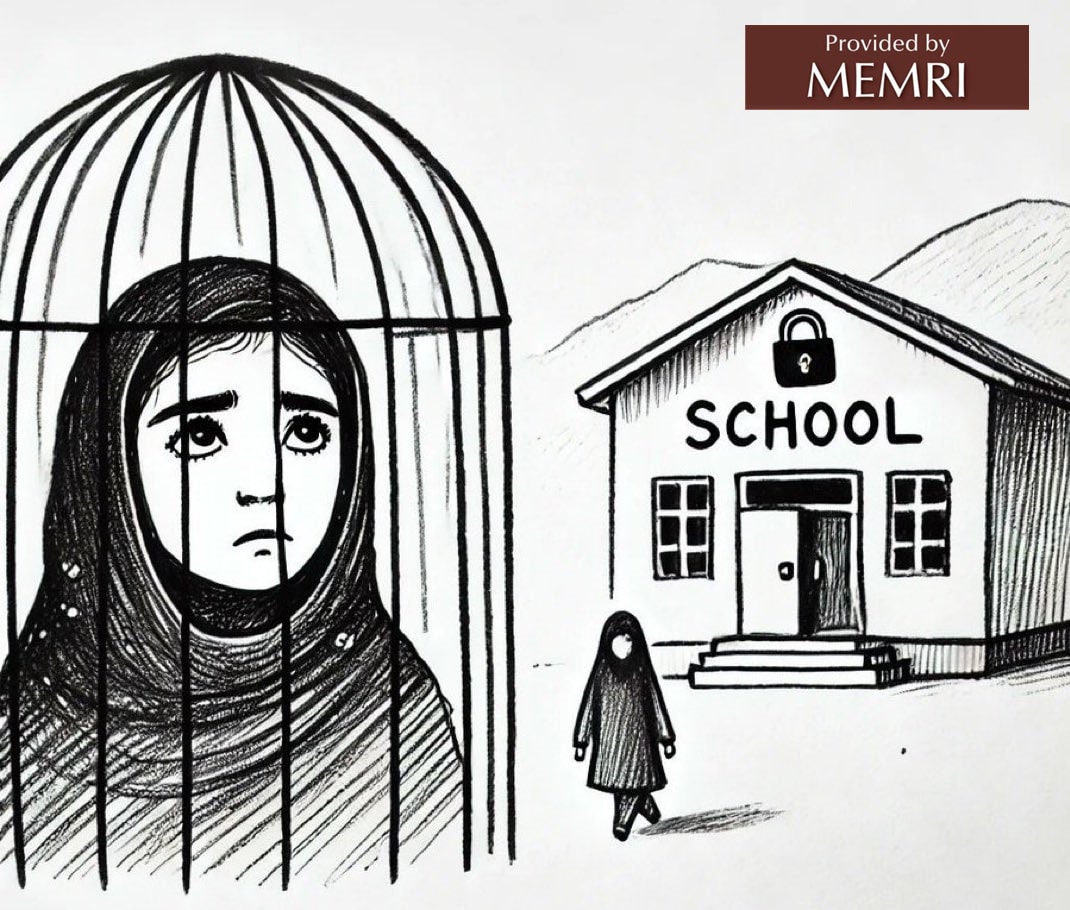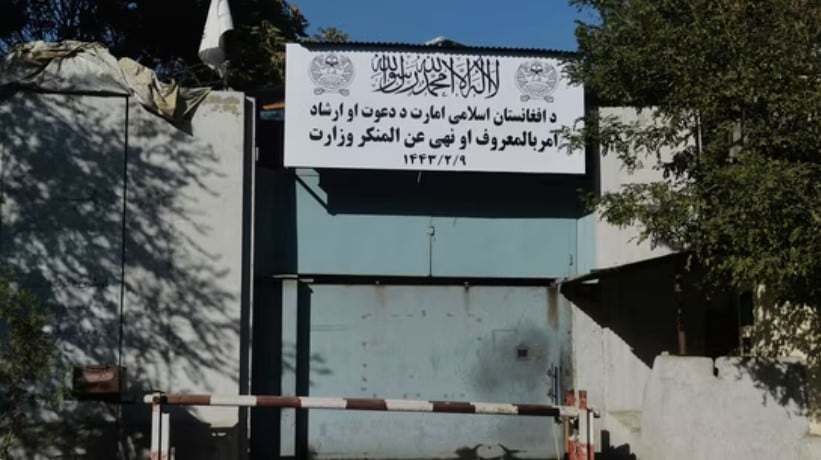Three years into their repression of women, the Afghan Taliban's Ministry for the Promotion of Virtue and Prevention of Vice took its oppressive regime further by introducing new regulations restricting Afghan women from giving takbir, i.e., calling out "Allahu Akbar," or even reciting Quranic verses aloud, even when among women.[1] Minister Mohammad Khalid Hanafi, who is under UN sanctions, claimed that according to shari'a, a woman's voice is considered "awrah," meaning it should be kept concealed.[2] He emphasized that a woman's voice should not be heard in public, and this rule now also applies in private settings, even when women are gathered together. He must be questioned in the light of early Islam.
In Afghanistan, women cannot own a smartphone. Girls and women are banned from parks, streets, and workplaces. They are forbidden from wearing bright clothing or high heels. They are denied education, prohibited from going to school beyond grade six. Singing is outlawed, as is participating in protests, working, riding in taxis, or playing and dancing. Women are not even allowed to speak to men they do not know. These restrictions have suffocated the lives of Afghan women, stripping them of their basic freedoms and autonomy.
Unmarried women or those without a mahram (a close male guardian) face even harsher limitations. They have been cut off from essential healthcare, prohibited from traveling long distances, and pressured and forced to leave jobs. Single and unaccompanied women, including an estimated two million widows, describe their existence in Afghanistan as one of being imprisoned within their own homes and unable to perform even the simplest tasks.[3]

Afghan girls cannot study beyond the sixth grade under Taliban rule (image courtesy: X)
Before the Taliban's takeover of power in August 2021, women in major cities like Kabul could be seen driving, but this freedom has been snatched away. The Taliban regime in Afghanistan has banned women from obtaining driving licenses, a restriction that extends across the land-locked country.[4] The regime now demands that women cover their entire face and body whenever they leave home, and they are forbidden from having their voices heard in public.[5]
Gulbuddin Hekmatyar, the former mujahideen commander and chief of Hizb-e-Islami Afghanistan, is perhaps the only prominent religious leader who has raised concerns over the Taliban's law mandating that women cover their faces in public, arguing that this interpretation of hijab ("veiling") goes beyond Islamic requirements.[6] He said that in Islam, the guidelines for women's dress are similar to those observed during Hajj, i.e., the pilgrimage to Mecca, and prayer. Specifically, he stated: "In prayer, [a woman] is not required to cover her face, and during ihram [i.e., Hajj], she is not required to cover her face or the palms of her hands."[7]
Hekmatyar pointed out that there is a consensus among Islamic jurists and religious scholars that a woman's face and hands are not considered awrah, or private parts requiring concealment. Additionally, Hekmatyar said that the Quran does not mandate covering a woman's face or hands, explaining that the instruction for men and women to lower their gaze would be unnecessary if women's faces were already covered.[8] "The Quranic verses clearly indicate," he said, "that the face is not included in the hijab. If the face is covered, lowering the eyes [as commanded in the Quran] would have no purpose or necessity."[9] Hekmatyar is not supported by Islamic religious scholars.
The Taliban's repressive policies against girls and women raise questions about the interpretation of Islam that the jihadis now in power seek to enforce. Their restrictions starkly contrast with the active and respected roles women played in early Islamic history. Umm Umara, who is also known as Nusayba bint Ka'b Al-Maziniyya (d. 634 CE), was a remarkable early supporter and companion of Prophet Muhammad. She famously fought in the 625 Battle of Uhud, where she defended the prophet with a sword and bow, sustaining 12 serious wounds, including deep scars she bore into old age.[10] Her courage was evident as she continued to fight, bleeding heavily, until she was eventually restrained.
Fatima bint Muhammad (d. 632 CE), the beloved daughter of Islam's founder, showed immense courage and devotion during significant moments in early Islamic history. She too participated in the Battle of Uhud, where the prophet was severely wounded despite the efforts of many companions to protect him.[11] Fatima tended to her father's wounds with Ali's help, washing away blood and using a burned piece of cloth to stop the bleeding.[12] She then joined other women in aiding the wounded, providing water to the fighters, and honoring the martyrs.
Zainab bint Ali (626-682 CE), the courageous granddaughter of Prophet Muhammad, displayed immense strength and leadership at the 680 Battle of Karbala.[13] Despite the profound grief of losing her father, brothers, and sons – Hassan poisoned and Hussain martyred – she took on the role of protector for the remaining family members, leading the captives through a gruelling journey from Karbala to Kufa and then to Damascus.[14] In the aftermath of the Battle of Karbala, Zainab bint Ali delivered a powerful and fearless speech in the court of the tyrant Yazid, condemning his cruelty and oppression. Despite being a captive, she spoke with authority, defending the honor of her family and inspiring future generations with her immense courage and unyielding faith in the face of unimaginable suffering.

Former mujahideen commander Gulbuddin Hekmatyar says Islam does not require women to cover their hands and face even during prayer and Hajj
According to an article published by Feminism In India, Khadijah bint Khuwaylid (554-619 CE), the first Muslim and wife of Prophet Muhammad, was a successful businesswoman in Mecca, known for her integrity and generosity.[15] She supported the prophet emotionally and financially, and their monogamous marriage lasted 25 years until her death, highlighting her unwavering support during the prophet's early years of prophethood.
Aisha bint Abu Bakr (613-678 CE), the youngest wife of the prophet, became a scholar who narrated over 2,200 hadiths (sayings and deeds of Muhammad) and actively engaged in political matters of the era.[16] Despite losing the Battle of the Camel against Ali, the prophet's son-in-law, she continued to influence Islamic scholarship, shaping future generations through her teachings and interpretations of hadiths.
The article cites many more cases where women have played a role in public life in the early days of Islam, which militates against the so-called shari'a principles being enforced by the Taliban rulers of Afghanistan. For example, Rabia al-Adawiyya (718-801 CE), a Sufi saint and poet, introduced the concept of Divine Love, prioritizing the love of God over fear or favor.[17] She chose asceticism over marriage and mentored countless followers, leaving a lasting impact on Sufi spirituality through her profound devotion and teachings.
Lubna of Cordoba, a 10th-century Andalusian scholar, managed the Royal Library and excelled as a mathematician, poet, and calligrapher.[18] Despite limited documentation of her life, her multifaceted expertise showcased women's intellectual contributions during her era, even in male-dominated fields, according to the article.
Al-Malika al-Hurra Arwa al-Sulayhi (1048-1138 CE), who ruled Yemen with remarkable intelligence and military prowess, relocated the capital and avenged her predecessor's death. Her reforms in education and the economy earned her the lasting affection of her people, who called her the Little Queen of Sheba.[19]
Sayyida Al-Hurra (1485-1542 CE) ruled Tetouan, a region in Morocco, "as an independent queen and commanded a pirate fleet" to control the Mediterranean.[20] Known as the last woman to hold the title Al-Hurra, she maintained her authority even after marrying the king of Morocco, challenging societal norms until her eventual deposition.[21]
The above examples prove that Muslim women have historically held leadership roles. Some notable examples can also be seen from South Asia. Benazir Bhutto from Pakistan became the first female prime minister of a Muslim-majority country, and Sheikh Hasina and Begum Zia had multiple terms as prime minister of Bangladesh. Much before them Raziya Sultan of India broke gender barriers in the 13th century to become the first and only female ruler to govern from the throne of Delhi.

In September 2021, the Taliban abolished the ministry of women's affairs, replacing it with the anti-women ministry for the promotion of virtue and prevention of vice
According to Time magazine, Queen Soraya Tarzi, the first Queen Consort of Afghanistan and wife of King Amanullah Khan, was a trailblazer for women's rights in the 1920s.[22] Afghan women got the right to vote in 1919, a year before American women got it. As the daughter of a liberal Afghan intellectual, she pushed for progressive reforms alongside her husband. King Amanullah once said: "I am your king but the minister of education is my wife, your queen," emphasizing her influence and dedication to advancing women's education.[23] Together they opposed practices like polygamy and the enforced veil, with Queen Soraya even removing her veil publicly and embracing modern styles. She established the first girls' school in Afghanistan and co-founded Ershad-e-Niswan ("Guidance for Women"), the country's first women's magazine in 1927.
It appears that Afghan Taliban officials do not have any understanding of Islamic history and the role played by Muslim women throughout history. The Taliban's interpretation of Islam raises critical questions about the nature of shari'a and how its principles are applied in contemporary society. Historically, Islam has been a religion that empowered women, as evidenced by the extraordinary roles played by Muslim women right from Hazrat Aisha and Zainab Bint Ali to Benazir Bhutto and Sheikh Hasina. These women exemplified strength, courage, and leadership, and their contributions were recognized and celebrated. This rich legacy highlights an Islam that values women's voices, promotes education, and encourages active participation in societal matters.
In stark contrast, the Taliban's repressive regime presents a distorted version of Islam that seeks to restrict and control women's lives through oppressive laws and regulations. This shift raises profound questions about the interpretation and implementation of Islamic teachings. The Taliban are implementing an orthodox version of Islam not present even during the era of Prophet Muhammad and his Companions and is not prevalent in any of the 57 Muslim countries that are members of the Organization of Islamic Cooperation (OIC).
It is clear that the Afghan Taliban's Ministry for the Promotion of Virtue and Prevention of Vice is presenting a distorted version of Islam in modern times and has become a source of all-round totalitarianism in the lives of Afghan women. It is time this ministry is brought before the International Court of Justice for crimes against humanity, especially for crimes against the girls and women of Afghanistan.
* Mantasha Ansari is a Research Assistant at MEMRI's South Asia Studies Project.
[1] Business Standard (India), October 30, 2024.
[2] Business Standard (India), October 30, 2024.
[3] Radio Free Europe/Radio Liberty (Prague, Czech Republic), January 21, 2024.
[4] Hindustan Times (India), May 5, 2022.
[5] YouTube, BBC News, September 10, 2024.
[6] MEMRI, Special Dispatch No. 11556, In Dari-Language Sermon, Hizb-e-Islami Afghanistan Chief Gulbuddin Hekmatyar Questions New Taliban Law Requiring Women Cover Their Faces In Public, September 12, 2024.
[7] MEMRI, Special Dispatch No. 11556, In Dari-Language Sermon, Hizb-e-Islami Afghanistan Chief Gulbuddin Hekmatyar Questions New Taliban Law Requiring Women Cover Their Faces In Public, September 12, 2024.
[8] MEMRI, Special Dispatch No. 11556, In Dari-Language Sermon, Hizb-e-Islami Afghanistan Chief Gulbuddin Hekmatyar Questions New Taliban Law Requiring Women Cover Their Faces In Public, September 12, 2024.
[9] MEMRI, Special Dispatch No. 11556, In Dari-Language Sermon, Hizb-e-Islami Afghanistan Chief Gulbuddin Hekmatyar Questions New Taliban Law Requiring Women Cover Their Faces In Public, September 12, 2024
[10] The University of Chicago Press (United States), October 2019.
[11] Medium (United States), November 15, 2016.
[12] Medium (United States), November 15, 2016.
[13] Views &News, September 5, 2020.
[14] Views &News, September 5, 2020.
[15] Feminism In India (India), June 26, 2017.
[16] Feminism In India (India), June 26, 2017.
[17] Feminism In India (India), June 26, 2017.
[18] Feminism In India (India), June 26, 2017.
[19] Feminism In India (India), June 26, 2017.
[20] Feminism In India (India), June 26, 2017.
[21] Feminism In India (India), June 26, 2017.
[22] Time Magazine (United States), March 5, 2020.
[23] Time Magazine (United States), March 5, 2020.




